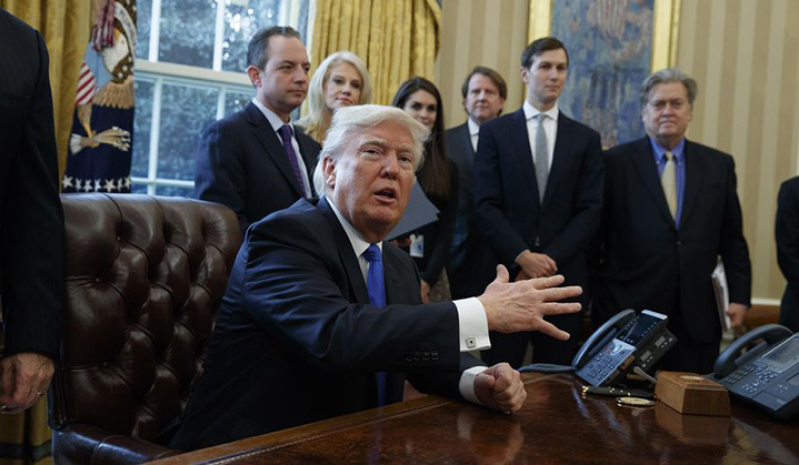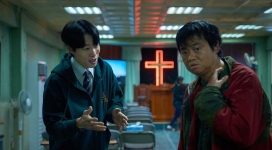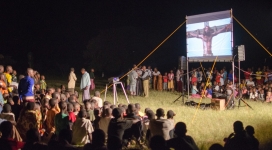
U.S. President Donald Trump signed an executive order Friday suspending the entire US refugee resettlement program for at least 120 days while "extreme-vetting" rules are established; U.S. religious leaders are urging the new administration to remember to base the new policies on mercy and compassion while ensuring the security of the nation.
The new measures fulfill one of his campaign vows, Trump said he is making America safe from "radical Islamic terrorists," a term that the previous administration had refused to use.
"This is big stuff," he declared at the Pentagon, after signing an executive order entitled "Protection of the nation from foreign terrorist entry into the United States," the AFP reported.
The order specifically bars Syrian refugees indefinitely.
No visas will be issued for 90 days to migrants or visitors from seven Muslim-majority countries: Iran, Iraq, Libya, Somalia, Sudan, Syria and Yemen.
Meanwhile, the order is also said to make it easier for Christians and other religious minorities in majority Muslim countries from entering the United States than it would for Muslims in general.
The Department of Homeland Security can now prioritize refugee claims made by people "on the basis of religious based persecution" as long as the person applying refugee status is "a minority religion in the individual's country of nationality."
The executive order closing the nation's borders to refugees was put into immediate effect on Friday night. Refugees who were airborne on flights on the way to the United States when the order was signed were stopped and detained at airports.
Two Iraqis were detained at the John F. Kennedy Airport in New York City, prompting their lawyers to file a writ of habeas corpus early Saturday seeking to have their clients released.
According to New York Times, one of the Iraqis detained at Kennedy Airport, Hameed Khalid Darweesh, had worked on behalf of the United States government in Iraq for 10 years. The other, Haider Sameer Abdulkhaleq Alshawi, was coming to the United States to join his wife, who had worked for an American contractor, and young son, the lawyers said.
Alshawi's wife has been living in Texas was tearful as she was being interviewed at her sister's house early Saturday in Houston. In an interview with a reporter, the 32-year-old woman showed a reporter a picture she had taken of her son's letter to Santa Claus, in which he wrote out his wish: "Dear Santa: Can you bring my Dad from Sweden pls." The boy had not seen his father in three years.
"I'm really breaking down, because I don't know what to do," she said. "It's not fair."
Just before he signed the measures on Friday, Trump said he is going to help the persecuted Christians in an interview with Christian Broadcasting Network.
"They've been horribly treated. Do you know if you were a Christian in Syria it was impossible, at least very tough, to get into the United States? If you were a Muslim you could come in, but if you were a Christian, it was almost impossible and the reason that was so unfair, everybody was persecuted in all fairness, but they were chopping off the heads of everybody but more so the Christians. And I thought it was very, very unfair."
However, Christian leaders are calling for the administration to not treat Christians with favor or bar Muslims.
"We would resist that strongly," Scott Arbeiter, president of World Relief, the humanitarian arm of the National Association of Evangelicals and one of nine agencies that partner with the federal government to resettle refugees, said, according to CNN.
"Some of the most vulnerable people in the world right now are Muslims. If we say no Muslim should be let in, we are denying the humanity and dignity of people made in the image of God."
Similarly, the Catholic head of Boston Archdiocese issued Friday a call for "mercy for those fleeing violence and persecution." Cardinal Sean P. O'Malley issued a statement on his blog just hours after attending the pro-life march in Washington, D.C. and posting a video on Twitter where he said that marchers were "so glad" that Vice President Mike Pence and his wife, Karen, had addressed the crowd.
O'Malley said that immigration has "come to occupy a central place in our national life today," and its reform should be based on "reason, compassion, mercy for those fleeing violence and persecution."
He said any move toward reform requires "respect for our legal system and a compassionate and creative path toward citizenship," and that "the criteria by which we admit refugees and immigrants requires a realistic plan for security of the nation joined with the commitment to welcome new people to our country, as we have always done."
Archbishop Jose H. Gomez of Los Angeles similarly called for mercy and end to deportations, and emphasized the importance of protecting the integrity of the family for a family unit is the cornerstone of society in an interfaith prayer service held in Nov.
"We are reminded that behind every 'statistic' is a person who is a mother, father, son, daughter, sister or brother and has dignity as a child of God," the bishop said.
Gomez also said at the prayer service that with the U.S. election final, children "are afraid" and "men and women are worried and anxious, thinking about where they can run and hide. This is happening tonight, in America."
"The answer is not angry words or violence in the streets. It never solves anything. It only inflames it more. We need to be people of peace, people of compassion. Love not hate. Mercy not revenge," he added.
In the Diocese of El Paso, Texas, Bishop Mark J. Seitz in a postelection statement likewise described the fear being felt by immigrants, refugees and Muslims in the U.S. because of Trump's campaign rhetoric against those groups.
"To you I would like to offer some assurances," the bishop said. "This country has elected a president, not a dictator. We, in this democratic republic have a system of checks and balances so that the rights of individuals are safeguarded. Campaign rhetoric is just that. Now comes the challenge of governing. For that, a leader must work with others and seek places of compromise."







